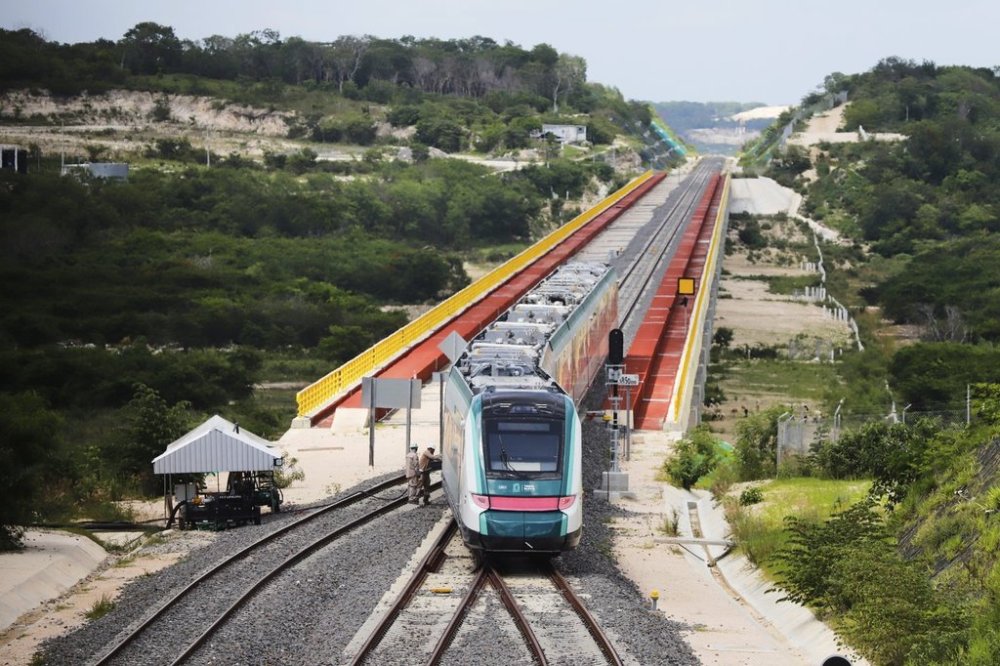Mexico, Guatemala and Belize to create tri-national nature reserve to protect Mayan jungle
Advertisement
Read this article for free:
or
Already have an account? Log in here »
To continue reading, please subscribe:
Monthly Digital Subscription
$0 for the first 4 weeks*
- Enjoy unlimited reading on winnipegfreepress.com
- Read the E-Edition, our digital replica newspaper
- Access News Break, our award-winning app
- Play interactive puzzles
*No charge for 4 weeks then price increases to the regular rate of $19.00 plus GST every four weeks. Offer available to new and qualified returning subscribers only. Cancel any time.
Monthly Digital Subscription
$4.75/week*
- Enjoy unlimited reading on winnipegfreepress.com
- Read the E-Edition, our digital replica newspaper
- Access News Break, our award-winning app
- Play interactive puzzles
*Billed as $19 plus GST every four weeks. Cancel any time.
To continue reading, please subscribe:
Add Free Press access to your Brandon Sun subscription for only an additional
$1 for the first 4 weeks*
*Your next subscription payment will increase by $1.00 and you will be charged $16.99 plus GST for four weeks. After four weeks, your payment will increase to $23.99 plus GST every four weeks.
Read unlimited articles for free today:
or
Already have an account? Log in here »
GUATEMALA CITY (AP) — The leaders of Mexico, Guatemala and Belize announced on Friday that they were creating a tri-national nature reserve to protect the Mayan rain forest following a meeting during which they also discussed expanding a Mexican train line criticized for slicing through jungle habitat.
The nature reserve would stretch across jungled areas of southern Mexico and northern parts of the two Central American nations, encompassing more than 14 million acres (5.7 million hectares). Mexican President Claudia Sheinbaum called the move “historic” and said it would create the second biggest nature reserve in Latin America, behind the Amazon rain forest.
“This is one of Earth’s lungs, a living space for thousands of species with an invaluable cultural legacy that we should preserve with our eyes on the future,” Sheinbaum said, standing side-by-side with Guatemalan President Bernardo Arévalo and Belize Prime Minister Johnny Briceño.

The announcement was met with cautious celebration by environmental groups like Mexico-based Selvame, who have sharply criticized the Mexican government and Sheinbaum’s allies in recent years for environmental destruction wrought by megaprojects like a controversial train line, known as the Maya Train.
The group said in statement that the reserve was a “monumental step for conservation” but that it hoped that the reserve was more than just “symbolic.”
“We’re in a race against the clock. Real estate and construction companies are invading the jungle, polluting our ecosystems, and endangering both the water we consume, and the communities that depend on it,” the group wrote.
It called on Sheinbaum’s government to put an effective monitoring system in place to “stop any destructive activities.”
At the same time, the leaders also discussed a proposal by Mexico to expand the very train line those environmental groups have long fought from southern Mexico to Guatemala and Belize. The thousand-mile train currently runs in a rough loop around Mexico’s Yucatan peninsula, and was created with the purpose of connecting Mexico’s popular Caribbean resorts with remote jungle and Mayan archaeological sites in rural areas.
However, it has fueled controversy and legal battles as it sliced through swathes of jungle and damaged a delicate cave system in Mexico that serves as the area’s main source of water. In a span of four years, authorities cut down approximately 7 million trees, according to government figures.
Sheinbaum’s mentor and predecessor former President Andrés Manuel López Obrador fast-tracked the train project without detailed environmental studies. The populist repeatedly ignored orders from judges to stop construction due to environmental concerns and publicly attacked environmentalists warning about damage done to fragile ecosystems.
López Obrador first proposed the idea of expanding the train to Guatemala, and Sheinbaum has continued to push for the project. On Friday, she said the extension would usher in development in rural areas with few economic opportunities.
But Arévalo was already on record saying Guatemala’s laws would not allow it to be built through protected jungle in the north of the country.
The Guatemalan leader said on Friday he sees the economic potential of the project to the jungle region but remained adamant that the construction should not come with the kind of environmental damage that it inflicted in Mexico.
“Connecting the Maya Train with Guatemala and eventually with Belize is a vision we share,” Arévalo said. But “I’ve made it very clear at all times that the Maya Train will not pass through any protected area.”
He said there would also have to be careful environmental studies and the two presidents looked at an alternative proposal that would have the train loop instead of directly cut through the jungles of Guatemala and Belize.
It remained unclear how the train’s potential route would be affected by the new protected area.
——
Janetsky reported from Mexico City.

